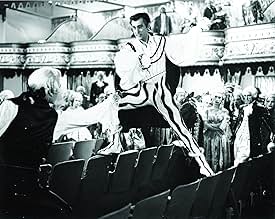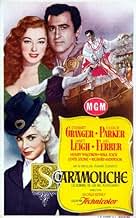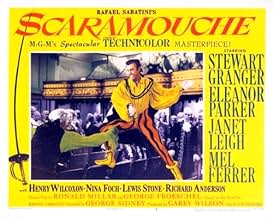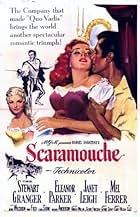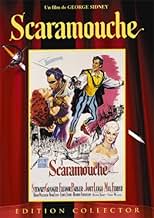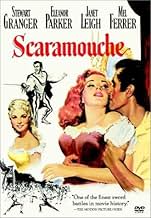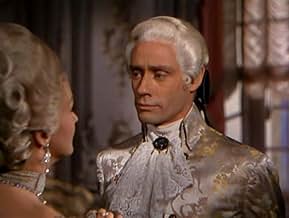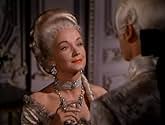IMDb-BEWERTUNG
7,5/10
6495
IHRE BEWERTUNG
Füge eine Handlung in deiner Sprache hinzuIn France during the late 18th Century, a man sets out to avenge the death of his friend at the hands of a master swordsman.In France during the late 18th Century, a man sets out to avenge the death of his friend at the hands of a master swordsman.In France during the late 18th Century, a man sets out to avenge the death of his friend at the hands of a master swordsman.
- Auszeichnungen
- 2 Nominierungen insgesamt
Handlung
WUSSTEST DU SCHON:
- WissenswertesStewart Granger wore lifts in the film so he would appear to be the same height as his slightly taller co-stars Mel Ferrer, Henry Wilcoxon and Richard Anderson. Granger's height was often listed as 6'3" but it is widely believed he was actually 6'1".
- PatzerThe soldiers wear uniforms from the Napoleonic era, not the pre-Revolution period.
- Zitate
Andre Moreau: You may turn your back on Scaramouche, my lord, but surely you will not run away from Andre Moreau?
Noel, Marquis de Maynes: Scaramouche, you have just given your last performance.
[they fight]
- VerbindungenFeatured in Precious Images (1986)
Ausgewählte Rezension
The Commedia dell'Arte is an old Italian form of stage presentation, dating from the 16th century and featuring a series of stock characters like Arlecchino, Pantolone, Pulchnello, and Capitano. Everyone in the audience knew their comic weaknesses and looked forward to seeing them on display, kind of like a John Ford movie. The characters were called zanni and played practical jokes on each other (called "burle", which gives us "burlesque.") As in this movie the humor was often improvised. When the form was taken to France, Arlecchino became Harlequin, Pantalone became Pantaloon (from which we get our "pants"), Pulchinello morphed into Punch, and Capitano, a character who was a braggart soldier, was changed to Scaramouche and became an admired acrobatic mime, which suited French tastes. Sorry for the tedious introduction but it helps to get the interesting history out of the way fast.
The rest of the movie is a comic book and, like a comic book, filled with colorful people in comic-book costumes, zestful and exuberant. If you want a movie to have zip, one way of doing it is to have lots of people riding horses. But the horses should always be ridden at a gallop, and with slightly accelerated motion. (The gallops were shot partly in Golden Gate Park.) Another way of adding action is to have the lovers fight each other physically, as in "Taming of the Shrew", instead of wistfully melting into each others' arms at every meeting and parting. A third way is to build the main plot around a few well-choreographed action scenes -- and in this respect the movie is superb.
"Scaramouche" reminds one of Errol Flynn at his best, in "The Adventures of Robin Hood." Instead of Saxons and Normans, we have aristocrats and poor people. (Fortunately the Saxons in "Robin Hood" didn't win a revolution and implement a reign of terror.) The aristocrats dress in outrageously ornate costumes. The poor people are in dark clothes, like the figure on the Quaker Oats package.
There's quite a lot of fencing but much of it is brief and in long shot. There are three main encounters between Stewart Granger and his nemesis Mel Ferrer. Granger is manly and well built and forceful in his style. Ferrer is long-limbed and lanky, deceptively clumsy at times, but he has never given a more graceful physical performance.
In the first match between the two, Granger knows nothing about the sword and hacks away at Ferrer, who stands there nonchalantly, smiling, leaning on his weapon as if it were a walking stick between easy parries. In the second, Granger has picked up a few tricks but is still easily outmatched and has to escape through one of those secret doors in a paneled wall. The third match is more than six minutes long and is as well staged as any duel on screen -- better than anything in "Robin Hood" and at least as good as "The Mark of Zorro." Granger swings off the stage on a rope to confront Ferrer who is in the theater balcony. And you should see Stewart's wardrobe in this scene! Unbelievable skin-tight leotards, white boots with furry tops, a white cape -- everything -- mostly white with black accents. Ferrer strips off his jacket and is dressed in black shoes and stockings, black pants, black vest, and a white blouse with ruffles, mostly black, that is. (I warned you this was a comic book.) The ensuing duel wanders all over the theater while the spectators tumble out of the actors' way. Note the scene where the advantage changes from Ferrer to Granger when the fight moves from the bottom of the stairs to the rows of theater seats. Ferrer does an almost impossible balletic leap from one row to the next, twirling around in midair. (Another footnote: original ballet steps borrowed heavily from contemporary fencing movements. Sorry.)
The movie has its sad moments too, and the plot is a bit complicated although never hard to follow. But its overall tonus is comedic, as befits Scaramouche's venue. Granger may not be Errol Flynn but he's pretty good, and a better actor. The two women in his life are adequate, but Janet Leigh was a beginner and it shows. She was to be better in some later movies like "Psycho." She looks like a porcelain doll in some shots. The supporting players are all professionally competent.
It's an entertaining and well-crafted piece of entertainment -- exciting and vibrant with color. A comic book worth checking out.
The rest of the movie is a comic book and, like a comic book, filled with colorful people in comic-book costumes, zestful and exuberant. If you want a movie to have zip, one way of doing it is to have lots of people riding horses. But the horses should always be ridden at a gallop, and with slightly accelerated motion. (The gallops were shot partly in Golden Gate Park.) Another way of adding action is to have the lovers fight each other physically, as in "Taming of the Shrew", instead of wistfully melting into each others' arms at every meeting and parting. A third way is to build the main plot around a few well-choreographed action scenes -- and in this respect the movie is superb.
"Scaramouche" reminds one of Errol Flynn at his best, in "The Adventures of Robin Hood." Instead of Saxons and Normans, we have aristocrats and poor people. (Fortunately the Saxons in "Robin Hood" didn't win a revolution and implement a reign of terror.) The aristocrats dress in outrageously ornate costumes. The poor people are in dark clothes, like the figure on the Quaker Oats package.
There's quite a lot of fencing but much of it is brief and in long shot. There are three main encounters between Stewart Granger and his nemesis Mel Ferrer. Granger is manly and well built and forceful in his style. Ferrer is long-limbed and lanky, deceptively clumsy at times, but he has never given a more graceful physical performance.
In the first match between the two, Granger knows nothing about the sword and hacks away at Ferrer, who stands there nonchalantly, smiling, leaning on his weapon as if it were a walking stick between easy parries. In the second, Granger has picked up a few tricks but is still easily outmatched and has to escape through one of those secret doors in a paneled wall. The third match is more than six minutes long and is as well staged as any duel on screen -- better than anything in "Robin Hood" and at least as good as "The Mark of Zorro." Granger swings off the stage on a rope to confront Ferrer who is in the theater balcony. And you should see Stewart's wardrobe in this scene! Unbelievable skin-tight leotards, white boots with furry tops, a white cape -- everything -- mostly white with black accents. Ferrer strips off his jacket and is dressed in black shoes and stockings, black pants, black vest, and a white blouse with ruffles, mostly black, that is. (I warned you this was a comic book.) The ensuing duel wanders all over the theater while the spectators tumble out of the actors' way. Note the scene where the advantage changes from Ferrer to Granger when the fight moves from the bottom of the stairs to the rows of theater seats. Ferrer does an almost impossible balletic leap from one row to the next, twirling around in midair. (Another footnote: original ballet steps borrowed heavily from contemporary fencing movements. Sorry.)
The movie has its sad moments too, and the plot is a bit complicated although never hard to follow. But its overall tonus is comedic, as befits Scaramouche's venue. Granger may not be Errol Flynn but he's pretty good, and a better actor. The two women in his life are adequate, but Janet Leigh was a beginner and it shows. She was to be better in some later movies like "Psycho." She looks like a porcelain doll in some shots. The supporting players are all professionally competent.
It's an entertaining and well-crafted piece of entertainment -- exciting and vibrant with color. A comic book worth checking out.
- rmax304823
- 28. Juli 2003
- Permalink
Top-Auswahl
Melde dich zum Bewerten an und greife auf die Watchlist für personalisierte Empfehlungen zu.
Details
Box Office
- Budget
- 3.500.000 $ (geschätzt)
- Laufzeit1 Stunde 55 Minuten
- Seitenverhältnis
- 1.33 : 1
Zu dieser Seite beitragen
Bearbeitung vorschlagen oder fehlenden Inhalt hinzufügen

Oberste Lücke
By what name was Scaramouche - Der Mann mit der Maske (1952) officially released in India in English?
Antwort

